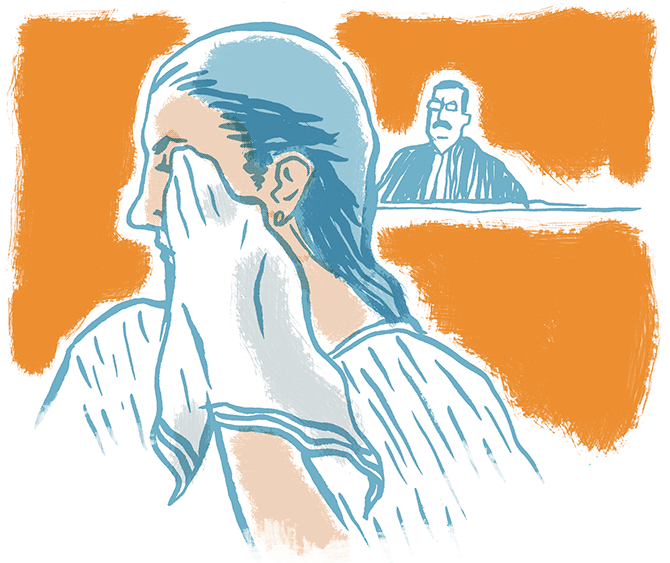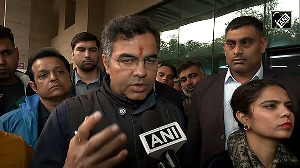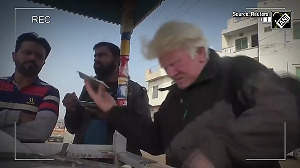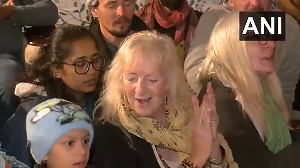She continued to cry, harder, feebly dabbed her eyes with the handkerchief she had received, and declared painfully: "He is hurting my emotions!"
Vaihayasi Pande Daniel reports from the Sheena Bora murder trial.
Illustration: Rediff.com/Dominic Xavier

"Does anybody have a handkerchief?" CBI Special Judge Jayendra Chandrasen Jagdale asked the room.
Given that CBI Special Courtroom 51's quota of hankies were all probably collectively rather sweat-stained and smelly, no one came forward.
Finally, Kajal Sharma's husband, a tall, bespectacled man, wearing office attire, got up from his front row seat and went to the witness stand to offer a snowy handkerchief to his wife, even as fat tears started seeping out of her eyes.
Shrikant Shivade, Accused No 4 Peter Mukerjea's suave lawyer, achieved, Thursday May 31, what Sudeep Pasbola's patient badgering had not, in the long week he had Sharma, Indrani Mukerjea's secretary, in the witness stand, through hearings in April and May in the Sheena Bora murder trial.
It is what they call in legal terms the breaking of a witness.
The feisty Sharma, who bravely fielded, ducked and survived pretty much everything thrown at her during her turn in the witness stand, on the very last day, met her nemesis in Shivade.
It was not hard to understand why.
She was actually out-besting the lawyer almost till the very end of the hearing, rather smartly, when her breaking point arrived.
From the outset, Sharma essayed the role of the dutiful secretary with ease, in spite of Shivade's growing impatience.
How little she knew about just about anything was beyond belief and could have been written on a revenue stamp.
Sharma didn't know how to set up an e-mail account.
She didn't remember the first steps to initiating a Skype call.
She didn't know that a document on a computer could be auto-saved.
She didn't know you could change the settings of a computer to make sure it saved a document every minute or whatever.
She didn't know that Skype utilised the Internet.
She didn't know that documents on a computer showed the date and time they were saved.
She didn't know that the length of a conversation showed on the screen when one was talking on Skype.
Playing the little woman, without a fault, she often answered helplessly with "Itna zyada deep nahin maloom. Itna andar ka knowledge nahin hai. (Such extensive deep knowledge I don't have. Such inside knowledge I don't have)" about the simplest tasks.
Her forgetfulness reached a new high. She was blank about most everything.
Of course, amnesia, giant fluffy clouds of it, float in the air, along with the dust particles, in every courtroom. It can be a reluctant witness's sharpest weapon. You don't know anything about this alarming epidemic of memory loss till you start attending court.
It was as if Sharma had enclosed herself in a pleasant little walled garden that no one had access to.
Shivade's style was equally smooth.
The crisply dressed lawyer, who was already wearing a well-cut lawyer's jacket, carefully donned a pair of his softest velvet gloves and, initially, very gently and respectfully cross-questioned Sharma.
His soothing, mellow, tones softened Sharma, who returned equally polite answers to him.
An immensely civilised discussion evolved.
There was no war of words in Courtroom 51 Thursday. It was all as genteel as a Buckingham Palace garden party.
But most of Sharma's answers were obvious non-answers.
The stuff that could put you to sleep in a twinkling, on a drowsy, hot afternoon like Thursday.
Everyone in the room looked listless and semi-conscious, including Accused No 1, 2 and 4 in the enclosure at the back.
This purposeless question and answer session droned on for nearly an hour.
If Shivade was trying to achieve a narrative or make a point out of Sharma's answers it wasn't happening. Or maybe he was and one wasn't aware of his clever strategy.
A sample (just a few, please note, to avoid sleep-inducing copy):
Shivade: "Shyamvar Rai ko kab se jaante hai? (Since when do you know Shyamvar Rai, the Mukerjea driver?)"
Sharma: "Jab se mein join kiya 2004 mein (Ever since I joined in 2004)."
Shivade: "Uska number save karke rakha tha cell pe? (Did you have his number saved on your cell?)"
Sharma: "Second time jab aayi (When I joined the second time, after she returned from Hong Kong)."
Shivade: "Kabhi woh phone karte the aap ko, aur kabhi aap unko phone karte the kaam par? (Sometimes he phoned you and sometimes you phoned him on work?)"
Sharma: "Jee ha (Yes)..."
Shivade: "Skype ID mein password hota hai, ki bina password ka call kar sakte hai? (Do you need a password to call on Skype or can you call without a password?)"
Sharma: "Password hota hai (Yes it has a password)." Hurrah! there was something she knew.
Shivade: "E-mail mein password hota hai? (Is there a password for e-mail?)"
Sharma: "Jee password hota hai (Yes it has a password). Hurrah again! One more thing she knew!
Although Sharma, who was wearing a red and gold kurta, gold tights and her pointy black flats, stated to the room that she had stopped using Skype for three years and her e-mail, she later stated that she had created a new account for herself -- a personal account, she stressed -- in 2016.
How she created it was a mystery since she didn't know how to create e-mail accounts.
Later in the hearing, the Q and A came to the touchy "galat kaam" aspect of what the secretary did, allegedly directed by Indrani, in June-July 2012.
That is the forging of Sheena Bora's signature on a resignation letter which she despatched to Mumbai Metro One where Sheena worked, the replication of that same signature on the cancellation of the leave and license agreement for Sheena's rented flat and creating an e-mail account in Sheena's name.
Shivade very carefully broke down each of these actions into tiny palatable components, and examined them, all the time, in a slow, inexorable, way building the enormity of the wrongness of the whole enterprise Sharma had embarked on that year.
He was doing it in almost movie director style, gradually erecting a huge monument, that ought to be Sharma's guilt, block by block.
You could almost hear a haunting score playing in the background.
Shivade first asked Sharma what she knew of Sheena Bora.
"Sheena Bora ko jantee thi? (Did you know Sheena Bora?)"
Sharma: "Nahin, Sir. Mujhe patta tha ki unka behen hai (No Sir. I knew she was the sister)."
Shivade dramatically: "Ek vyakti hai is duniya mein Sheena Bora kar ke. Kab se ye janti thi? (When did you become aware that there was a person in this world called Sheena Bora?)"
Sharma said some time after she started working for Indrani in 2004, she realised there was a sister and a brother too.
A few questions later, Shivade asked why she initially refused to sign as Sheena on that fateful resignation letter.
The judge cut in, saying this line of questioning had already happened with previous lawyers. But he added: "But he (CBI Special Prosecutor Bharat Badami) is not objecting and he should be the one objecting, so I will record the answer!"
Sharma: "Mein Sheena thodi thi (I wasn't Sheena) and I couldn't ask her (why she wasn't signing). Mein kyo Sheena ki signature karu? (Why should I sign for Sheena?) I wanted to know why I had to do it."
Shivade, advancing towards his key questions, probed: "Aap ko maloom tha ki galat hai (You knew it was wrong)."
The CBI lawyers raised objections since it was a question asked many times before.
The advocate artfully turned his question around: "Did you know that if you gave this letter in her job would go. Job khatam hota. Salary bhi? (The job would finish. Salary too?)," Shivade asked specifically, working on making Sharma feel uneasy.
Sharma uncomfortably: "Yes."
Shivade asked if she was a trustworthy employee and if she followed whatever instructions were given to her. The secretary said she did.
Shivade: "Even if it was wrong?!"
Sharma: "As per my knowledge galat instruction nahin tha (They were not wrong instructions)."
Shivade, his eyebrows raised: "To sign a resignation letter and send it?"
Sharma started off on her oft rehearsed and now tired why-it-was-not-galat-kaam spiel.
Shivade interrupted her, rudely this time, velvet gloves chucked away somewhere: "I don't want to hear a speech!"
Sharma endeavoured again to explain that had she felt it wrong she would not have done what Indrani had instructed that month in 2012.
Shivade more rudely: "Look at me! I don't want to know what you think!"
Judge Jagdale cut in, reasoning logically, that she would have to first say what she thought since he was, after all, asking her why she did something.
The secretary said they were her boss' instructions.
Shivade, searching and scrutinising Sharma's motives astutely, constantly massaging and building up her guilt trip, then queried her softly that if a boss gave (morally) wrong instructions did one still follow them.
Sharma persevered.
She said till then her boss had never given her instructions that were wrong/unlawful.
How did she subsequently know that this set of instructions would turn out wrong.
She added, her voice breaking, turning to the judge: "Mein ne end day tak honestly kaam kiya (Right till the last day I worked honestly)."
Shivade ordered, still impolite: "Yeh dekhiye! (Look here!)"
Sharma said she did not want to look at him and dissolved into tears.
After a pause, Shivade, his tone polite and kind once again, offered a conciliatory: "You were an extremely loyal employee."
That didn't go down well with Sharma either.
She continued to cry, harder, and feebly dab her eyes with the handkerchief she had received and declared painfully: "He is hurting my emotions!"
She took a few minutes to get a hold of herself.
When her tears had all but dried, she squared her shoulders, desperately gathered together her tattered courage, pulling it about her like a long cloak, and faced Shivade again.
The advocate wanted to know about her cell phone conversations, with both Rai and Indrani, in the run up to the murder and after it.
Shivade: "But on April 30th did Indrani call you at about 6 or 7 in the evening?"
Sharma shortly and coldly: "Bahut baar call karti thi (She called many times)."
Shivade: "On that date did she give the cell to Peter and did you say 'Jiju hi, I am fine? (pretending she was Sheena calling from America)"
Sharma fiery once again, the strong-willed, fighting Kajal of before: "Yeh bilkul galat hai! (That is completely wrong!)"
Shivade: "This was your pre-planned act to say 'Jiju hi...' The police and the CBI wanted to make you an accused in this case..."
Sharma firmly: "Nahin mujhe koi dhamki nahin diya! (No one threatened me!)"
Shivade accused her of concocting the Jiju statement, so Peter would not get bail at the CBI's behest.
He said that rather than she approaching the CBI, as she had told the court in April, they had approached her and grilled her for four hours and instructed her to give this false testimony.
Concluding, Shivade pronounced sternly: "Yeh aap jhoot gavai de rahi hai! (You have given false testimony!)"
The bumpy, gripping, cross-examination of Kajal Sharma had at last come to an end.
The next witness is expected in court on June 4. Badami promised to the expectant court he would give the name over to the defence in good time. The judge joked that he was scared to give the name.
The only clue he offered was that it was someone local. That ruled out Mekhail, Indrani's son for the time being. Could it be Rahul Mukerjea, Peter's son and Sheena's boyfriend? Or maybe it will be a DNA expert.
Badami and his colleague Kavita Patil went over to the now calm Sharma and complimented her for her competent handling of the cross examination, even through rough, choppy seas, like she did on Thursday.
Badami even commented that her expressions in court had been very good and appropriate (whatever that meant).
He called for his driver and asked him to drop the couple back.
"Hopefully," offered Sharma's husband when he was asked if they were relieved that the cross-examination was now behind them, as they exited Courtroom 51.
The hearing was over by past 4. Even in courtrooms that are open, the summer hours are still in place and everything, including the rooms, shut down by around 4.
Everyone was hustled out, including the accused who were asked to sit outside as Peter embarked on his lengthy lunch that his sister Shangon Das Gupta unfailingly brings him.
The squad of police personnel, happy to be on summer hours too, began to get rather restless, as Peter plodded through the various courses of his meal. They all stood around, edging closer, literally watching each bite travel into his mouth.
From time to time one of the cops would come over to Indrani, dressed in all white on Thursday, and ask her to depart first.
She refused, saying Peter was still eating and they could not leave anyway.
Finally, the driver of the prison bus arrived, climbing up from below, to see what was taking his charges so long. Peter was on his fruit salad by then.
He too joined the ranks and stood around as Peter reached his final course -- his chai/coffee.
And then this now well-recognised trio of accused was off, back to jail, herded by the one-and-a -half dozen policemen through the quiet court complex, to the bus at the end of a scorching summer afternoon.
- MUST READ: The Sheena Bora Murder Trial











 © 2025
© 2025